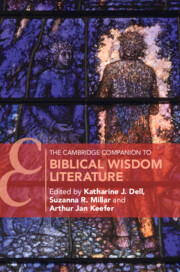Book contents
- The Cambridge Companion to Biblical Wisdom Literature
- Cambridge Companions to Religion
- The Cambridge Companion to Biblical Wisdom Literature
- Copyright page
- Contents
- Contributors
- Acknowledgement
- Abbreviations
- Part I The Context of Wisdom Literature
- Part II Wisdom Literature in the Hebrew Bible
- Part III Wisdom Literature beyond the Hebrew Bible
- 14 Ben Sira
- 15 The Book of Wisdom
- 16 Wisdom at Qumran
- 17 Egyptian Wisdom
- 18 The Syro-Palestinian Wisdom of the Late Bronze Age
- 19 Mesopotamian Wisdom
- Part IV Themes in the Wisdom Literature
- Bibliography
- Index
- Cambridge Companions to Religion
- References
16 - Wisdom at Qumran
from Part III - Wisdom Literature beyond the Hebrew Bible
Published online by Cambridge University Press: 28 July 2022
- The Cambridge Companion to Biblical Wisdom Literature
- Cambridge Companions to Religion
- The Cambridge Companion to Biblical Wisdom Literature
- Copyright page
- Contents
- Contributors
- Acknowledgement
- Abbreviations
- Part I The Context of Wisdom Literature
- Part II Wisdom Literature in the Hebrew Bible
- Part III Wisdom Literature beyond the Hebrew Bible
- 14 Ben Sira
- 15 The Book of Wisdom
- 16 Wisdom at Qumran
- 17 Egyptian Wisdom
- 18 The Syro-Palestinian Wisdom of the Late Bronze Age
- 19 Mesopotamian Wisdom
- Part IV Themes in the Wisdom Literature
- Bibliography
- Index
- Cambridge Companions to Religion
- References
Summary
In ‘Wisdom at Qumran’, David Skelton takes stock of the Dead Sea Scrolls and shows that they, in some ways, differ from the wisdom literature of the OT. The Scrolls lack those references to Solomon that seem so characteristic to biblical wisdom, and whilst they exhibit Wisdom as a personification, she is ‘toned down’ and appears more passive than she does in, say, Proverbs 1–9. Amplified in tone are the torah-wisdom connection and apocalyptic nature of the Qumran materials, not least the well-known raz nihyeh. Skelton also discusses the importance of poverty and hymnody in the Scrolls, to conclude by drawing these many distinctives together, as well as the Hellenistic context, pedagogy, and scribal practices, in order to reconsider the notion of ‘wisdom literature’ and the scholarly consensus surrounding it.
- Type
- Chapter
- Information
- The Cambridge Companion to Biblical Wisdom Literature , pp. 303 - 322Publisher: Cambridge University PressPrint publication year: 2022

